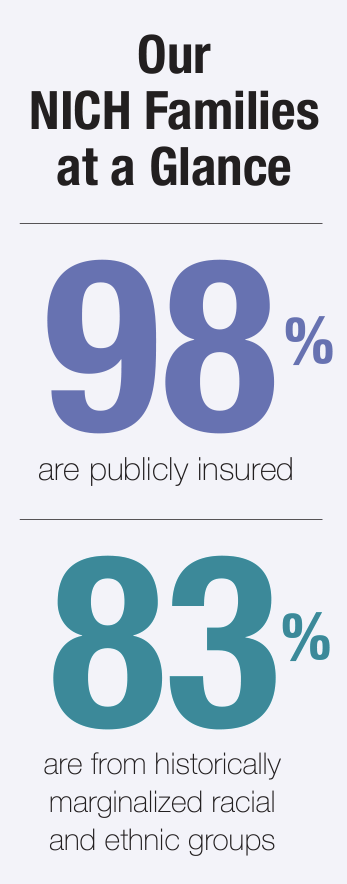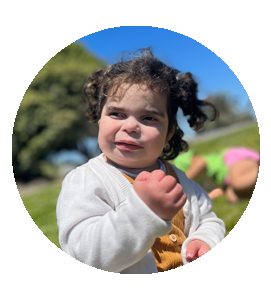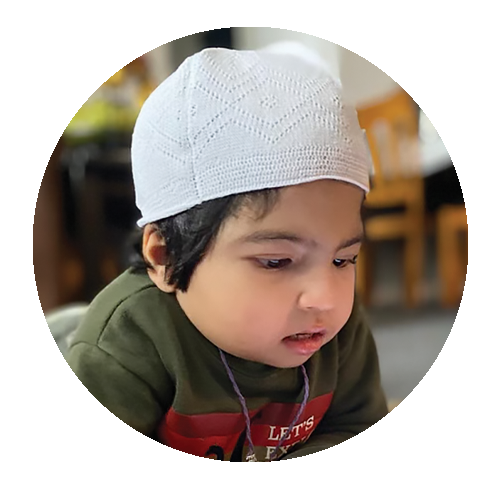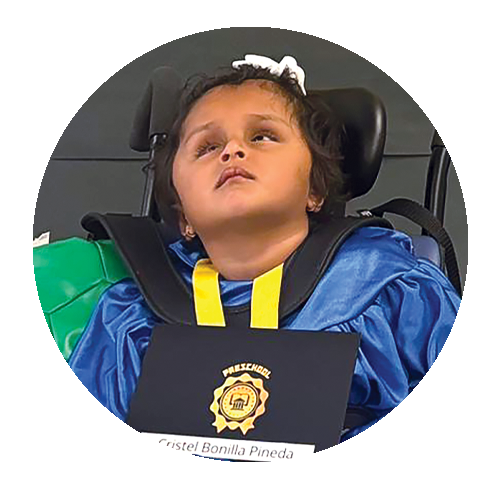NICH: Easing the Burden of Complex Care
How UCSF's Novel Interventions in Children's Healthcare is Changing Lives
For families who struggle to afford food, housing, and health care, supporting a child with a complex medical condition is a daunting challenge. Combine that with language barriers, pending immigration status, and single parenting, and it can be close to impossible.
UCSF’s Novel Interventions in Children’s Healthcare (NICH) program was launched in 2020 to support vulnerable children and teens with complex medical conditions and life circumstances. Program participants are paired with a NICH interventionist who spends hours every week with the family at clinics, in their home, and in their community. The interventionist learns about their situation, builds a personal relationship, and provides tailored support – from coordinating medical care to navigating complex treatment plans and accessing crucial resources like childcare and stable housing.
After a year with NICH, families graduate with the skills, support, and confidence they need to effectively manage a complex medical diagnosis. All NICH services are provided free of charge, thanks largely to philanthropic support.
Hear from four families about how NICH has positively impacted their lives.

Mariana, 3
Mariana Gutierrez was born with a genetic  disorder that left her reliant on a feeding tube. In the year before starting NICH, the Gutierrez family visited the Emergency Department at UCSF Benioff Children’s Hospital Oakland half a dozen times, usually because the tube had become dislodged. When bilingual NICH interventionist Molly Robins met her, Mariana was making just a few sounds and was not yet walking. Molly realized immediately that language barriers had made it extremely difficult for the Gutierrez family to navigate their daughter’s complicated care regimen, and geographic distance and demanding work schedules were making it nearly impossible to attend her appointments. With Molly’s help, Mariana’s mom and dad learned to operate her feeding equipment and know who to call when concerns arise. Their visits to the ED have declined dramatically, and Mariana is gaining weight, making sounds, smiling, and learning to walk. “Molly made things that were difficult easier,” says Mariana’s mom, Isela. “I feel so much more prepared.”
disorder that left her reliant on a feeding tube. In the year before starting NICH, the Gutierrez family visited the Emergency Department at UCSF Benioff Children’s Hospital Oakland half a dozen times, usually because the tube had become dislodged. When bilingual NICH interventionist Molly Robins met her, Mariana was making just a few sounds and was not yet walking. Molly realized immediately that language barriers had made it extremely difficult for the Gutierrez family to navigate their daughter’s complicated care regimen, and geographic distance and demanding work schedules were making it nearly impossible to attend her appointments. With Molly’s help, Mariana’s mom and dad learned to operate her feeding equipment and know who to call when concerns arise. Their visits to the ED have declined dramatically, and Mariana is gaining weight, making sounds, smiling, and learning to walk. “Molly made things that were difficult easier,” says Mariana’s mom, Isela. “I feel so much more prepared.”
Farhan, 4
 Born with a rare chromosomal abnormality, Farhan Samimi lives with developmental delays, spinal and muscle disorders, asthma, and dysphagia (difficulty swallowing). He is cared for by seven subspecialists at UCSF, in addition to physical, occupational, and speech therapists. Farhan’s dad, Gul Ahmad, the family’s only English speaker, was struggling to communicate with so many providers and track down the supplies, educational resources, and outside therapies that Farhan so badly needed. Enter NICH interventionist Gabrielle Woodland, who provided the family with moral and logistical support. “As a newcomer [to the US], I just couldn’t manage everything on my own,” says Gul Ahmad. “Gabrielle is my backup in everything. Now, we don’t miss appointments. We don’t go to the emergency room. Farhan has a teacher and home schooling. Gabrielle even helps us personally. She supports my wife when she is crying. She encourages us, tells us everything will be OK, and it truly is.”
Born with a rare chromosomal abnormality, Farhan Samimi lives with developmental delays, spinal and muscle disorders, asthma, and dysphagia (difficulty swallowing). He is cared for by seven subspecialists at UCSF, in addition to physical, occupational, and speech therapists. Farhan’s dad, Gul Ahmad, the family’s only English speaker, was struggling to communicate with so many providers and track down the supplies, educational resources, and outside therapies that Farhan so badly needed. Enter NICH interventionist Gabrielle Woodland, who provided the family with moral and logistical support. “As a newcomer [to the US], I just couldn’t manage everything on my own,” says Gul Ahmad. “Gabrielle is my backup in everything. Now, we don’t miss appointments. We don’t go to the emergency room. Farhan has a teacher and home schooling. Gabrielle even helps us personally. She supports my wife when she is crying. She encourages us, tells us everything will be OK, and it truly is.”
Cristel, 4
 Cristel Bonilla was born with congenital toxoplasmosis, a parasitic infection that left her blind, developmentally delayed, dependent on a feeding tube, and living with cerebral palsy. A single parent and recent arrival from Guatemala, Cristel’s mother, Clansy, was undocumented, drowning in financial insecurity – she was unable to afford rent and transportation to the hospital – and at risk of homelessness. Bilingual NICH interventionist Elizabeth Saenz went into triage mode, rapidly identifying existing resources that could stabilize the Bonillas’ situation. She immediately connected Clansy with a free transportation service provided through her insurance, scheduled all of Cristel’s referral appointments, and attended those appointments with her to make sure nothing was lost in translation. Elizabeth also secured a car seat, rental subsidies, and special-needs daycare through local community programs. A year later, the Bonillas are on solid ground. Clansy gained legal status, received her work permit, and found affordable housing, and Cristel is thriving, thanks to consistent medical care.
Cristel Bonilla was born with congenital toxoplasmosis, a parasitic infection that left her blind, developmentally delayed, dependent on a feeding tube, and living with cerebral palsy. A single parent and recent arrival from Guatemala, Cristel’s mother, Clansy, was undocumented, drowning in financial insecurity – she was unable to afford rent and transportation to the hospital – and at risk of homelessness. Bilingual NICH interventionist Elizabeth Saenz went into triage mode, rapidly identifying existing resources that could stabilize the Bonillas’ situation. She immediately connected Clansy with a free transportation service provided through her insurance, scheduled all of Cristel’s referral appointments, and attended those appointments with her to make sure nothing was lost in translation. Elizabeth also secured a car seat, rental subsidies, and special-needs daycare through local community programs. A year later, the Bonillas are on solid ground. Clansy gained legal status, received her work permit, and found affordable housing, and Cristel is thriving, thanks to consistent medical care.
Nevaeh, 18
 NICH has also become a vital resource for older patients, some of whom are managing complex care on their own. This was the case for Nevaeh McCaskel, who lives with sickle cell disease, a painful blood disorder. For years, Nevaeh had struggled to get herself to appointments, often ending up hospitalized for pain episodes that flare more frequently without consistent treatment. Nevaeh’s grandmother – her primary caregiver – was unable to escort her due to health constraints of her own. NICH interventionist Maria Velasco stepped in to fill that role, arranging transportation, attending appointments, advocating for Nevaeh with medical staff, and scheduling referrals. But Nevaeh says Maria also became a friend: “We would hang out and talk about my appointments but also everything else. She is so nice to me. She really cares.” A recent graduate of both high school and NICH, Nevaeh hopes to become a nurse so she can use her experience as a patient to help others.
NICH has also become a vital resource for older patients, some of whom are managing complex care on their own. This was the case for Nevaeh McCaskel, who lives with sickle cell disease, a painful blood disorder. For years, Nevaeh had struggled to get herself to appointments, often ending up hospitalized for pain episodes that flare more frequently without consistent treatment. Nevaeh’s grandmother – her primary caregiver – was unable to escort her due to health constraints of her own. NICH interventionist Maria Velasco stepped in to fill that role, arranging transportation, attending appointments, advocating for Nevaeh with medical staff, and scheduling referrals. But Nevaeh says Maria also became a friend: “We would hang out and talk about my appointments but also everything else. She is so nice to me. She really cares.” A recent graduate of both high school and NICH, Nevaeh hopes to become a nurse so she can use her experience as a patient to help others.